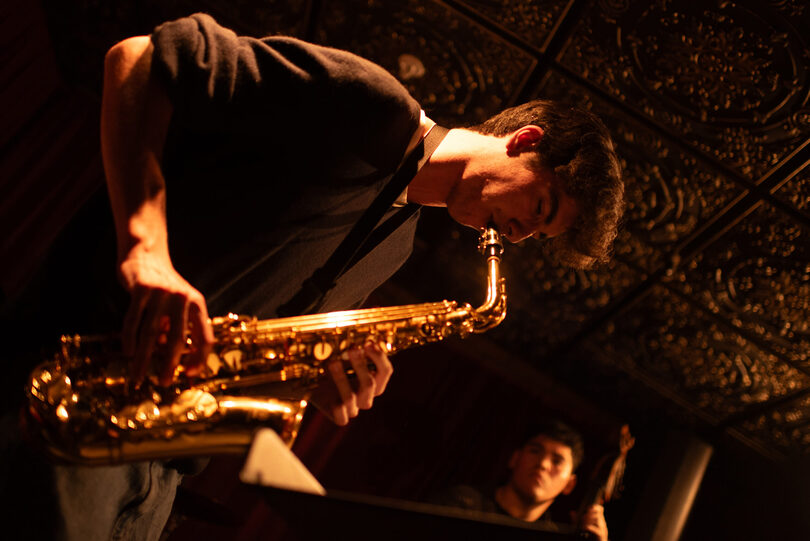The Scene draws students off the Hill with promises of free jazz, dash of Brooklyn

The Scene provides craved live performance experience for student musicians. The venue is "treasured" by the students who perform there. Ike Wood | Asst. Photo Editor
Get the latest Syracuse news delivered right to your inbox.
Subscribe to our newsletter here.
Marianne Solivan felt like Syracuse University’s campus was often far removed and fragmented from the city that surrounds it. Starting this year, the Setnor School of Music assistant professor is taking steps to bridge that gap through music.
“We’ve all been living through this isolation, and especially through quarantine, it sort of convinced us that it’s okay to be by ourselves and do things alone,” Solivan said. “And I’m like, ‘Man, I’ve been doing things alone my whole life. It’s for the birds. It’s not good.’”
Solivan started The Scene, a jazz group, this semester. The group, made up of a rotating cast of SU students, is hosting free monthly concerts downtown at The Fitz, with public jam sessions afterward. Solivan hopes to connect students to the larger Syracuse community and provide them with professional performance experience.
Solivan lives in Brooklyn and founded The Scene to bring a piece of New York City’s music lifestyle to Syracuse, she said. It isn’t just about performing, it’s about being connected to the community around you and staying aware of what other musicians are doing, she said.
One of Solivan’s main goals is to build a strong following of students and community members for the monthly concerts. She hopes the events become something various kinds of people want to go to.
“It’s not just a student thing, it’s a community thing. How do we get students off the Hill?” Solivan said
Gavin Casey, SU junior and drummer, said they’ve “treasured” this new opportunity to get together and perform with students and locals alike, especially after the closure of house venues like Dazed this semester.
“Everyone’s really feeling the loss of it, but stuff like The Scene is really cool when it comes around, because it’s nice to just be in a room with my friends, people I know, coming together again, and all being a part of the music,” Casey said.
Collaboration is a big part of what The Scene is about, Solivan said. The concerts begin with a performance by the band, and are followed by an hour-long jam session open to anyone. Students, professors and Syracuse locals are encouraged to bring an instrument of their choice and join the members on stage — no experience required.

Setnor School of Music assistant professor Marianne Solivan started The Scene this semester. With Brooklyn roots, Solivan hopes to bring some of New York City’s music culture to Syracuse. Ike Wood | Asst. Photo Editor
For the students, jam sessions mean they have to come ready to play anything and riff off each other.
“You have to play supporting the band and listen to what all the other instruments are doing,” Casey said. “If you can catch a motif that someone’s putting out there, or some accentuation that the vocalist is doing, then you can respond to that and they know they’re being heard.”
The group only rehearses once for an hour before each concert. Students scheduled to perform just need to know their instrument, their place in the band and have a good repertoire, Solivan said. If they know what they’re doing, playing without much practice shouldn’t be difficult.
Getting this group experience is essential for students because it mirrors how the music industry works, Solivan said. Musicians never know when they’ll get called to play with people they’ve never met. Sometimes a musician will get a call asking them to play a gig in a week and they just have to say yes, she said.
Mason Christopher Manteau, a senior sound recording technology major and saxophonist, said that’s the nature of jazz.
“Jazz culture is very different from, like, a rock band playing a show,” Manteau said. “Jazz is a lot more loose, and a lot of the music happens on stage, versus it all being preprogrammed.”
To play in the band, interested musicians must fill out a form to apply. Students who participate are paid by the venue, splitting a guarantee plus a percentage of bar sales.
Their first concert on Sept. 18 was a “big hit,” Solivan said. The room was full for the performance and many students and Syracusans brought their instruments to participate in the jam session.
To keep up the interest and promote their performances, Solivan and her team have been reaching out to organizations like CNY Jazz Central in New York and Greek life on campus. Their next shows are Oct. 23 and Nov. 20.
Aside from gaining professional experience, live performances let students share their talents and get important feedback on their work, Manteau said.
“Performing is such an important part of being a musician,” Manteau said. “It’s really motivating, creatively, to be able to get good reception — or any type of reception — on your work.”





